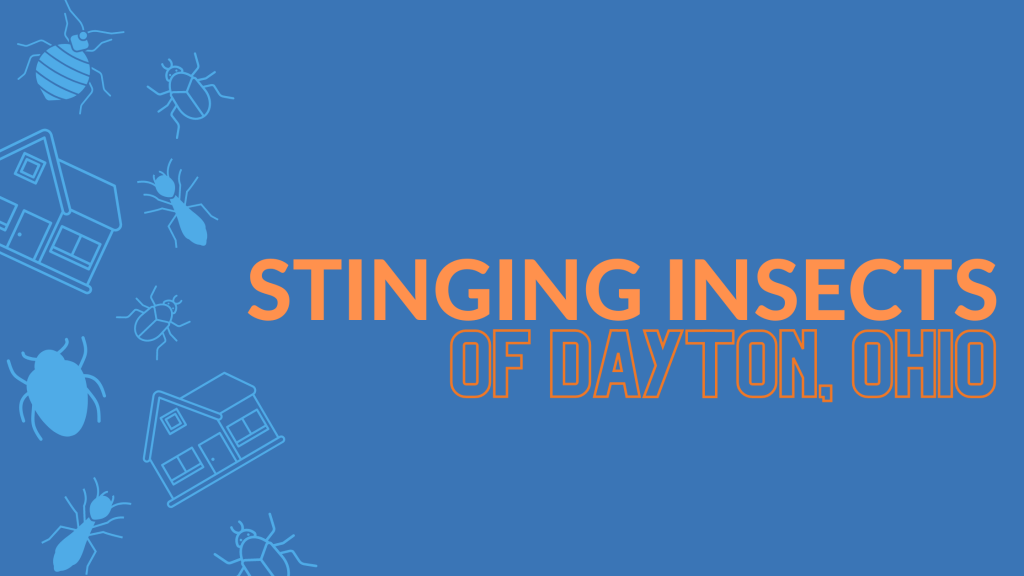What’s the Buzz: Exploring the Stinging Insects of Dayton, Ohio

As we enter the warmer summer months, the Dayton area begins to show signs of blooming landscapes and a vibrant community. However, along with its natural beauty, the region is also home to a variety of stinging insects. Understanding the different types of stinging insects found in Dayton is crucial for residents and visitors alike. In this article, we’ll take a closer look at some of the most common stinging insects in the Dayton area, shedding light on their behavior, habitats, and potential risks.
Yellow Jackets
Yellow jackets are perhaps the most common and aggressive stinging insects found in Dayton. These black and yellow insects are part of the wasp family and are known for their distinctive buzzing sound. Yellow jackets build nests in various locations, including underground burrows, trees, and shrubs. They can be particularly aggressive when their nest is threatened, making encounters dangerous for humans. It’s essential to exercise caution and seek professional assistance for nest removal if needed.
Paper Wasps
Paper wasps are another type of social wasp commonly found in Dayton. They are characterized by their slender bodies and long, dangling legs. Paper wasps construct their nests from chewed wood fibers and saliva, which gives them a papery appearance. Nests are often found under eaves, in attics, or on tree branches. Paper wasps can sting if they feel threatened, and their stings can cause localized pain and allergic reactions in some individuals.
Bald-Faced Hornets
Bald-faced hornets, despite their name, are actually a type of yellow jacket wasp. They are larger in size and possess distinct black and white coloration. Bald-faced hornets build large, paper-like nests, typically in trees, shrubs, or on structures like sheds or houses. They are known for their aggressive behavior when their nests are disturbed. Their stings can be painful and may cause severe reactions in sensitive individuals.
Honeybees
Honeybees are a vital part of our ecosystem, responsible for pollinating plants and producing honey. These bees are typically not aggressive unless their hive is threatened. Unlike wasps and hornets, honeybees have barbed stingers that remain lodged in the skin after a sting, leading to the bee’s demise. If you encounter a honeybee, it is best to remain calm and slowly move away without swatting or provoking them.
Cicada Killers
Cicada killers are large solitary wasps that can be found in the Dayton area during the summer months. As their name suggests, they specialize in capturing and paralyzing cicadas to feed their offspring. Although they may appear intimidating due to their size, cicada killers are generally non-aggressive towards humans. Males, however, can be territorial and may exhibit aggressive behavior, although they lack a stinger. It is best to avoid direct contact with these fascinating insects.
Tips To Avoid Getting Stung
Here are some additional tips to avoid being stung by stinging insects:
- Avoid wearing bright colors, as these can attract stinging insects.
- Do not leave food or drinks outside, as these can attract stinging insects.
- Trim your trees and shrubs, as these can provide nesting sites for stinging insects.
- Seal up any cracks or holes in your home, as these can provide entry points for stinging insects.
- If you see a stinging insect nest, do not disturb it. Call a professional to remove it.
Living In Harmony
Living in the Dayton area means sharing the environment with a diverse range of stinging insects. While it is important to appreciate their ecological significance, it is equally crucial to exercise caution and respect their habitats. If you encounter stinging insects, especially when they establish nests near your home or pose a threat, it is advisable to seek professional help, like that of go2-pros pest control, for safe removal and management.
By understanding the behavior and habits of these stinging insects, you can coexist peacefully with them and ensure a safer environment for yourself and the buzzing residents of Dayton, Ohio.
